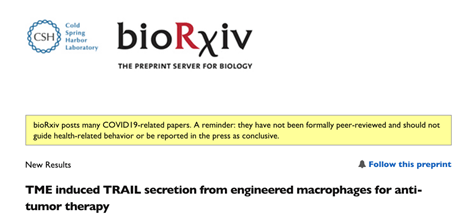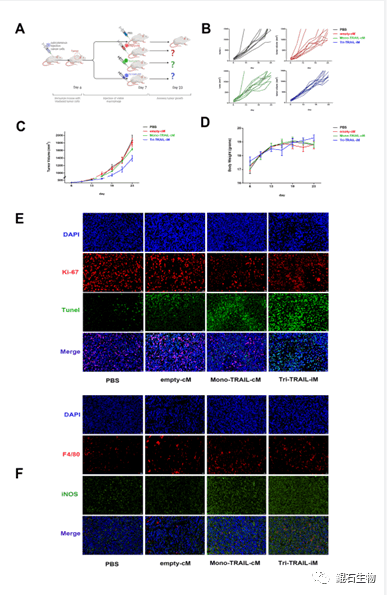
On May 1, 2022, the RocRock Bio team uploaded a study titled "TME induced TRAIL secretion from engineered macrophages for anti-tumor therapy" to the preprint website bioRxiv. In this study, RocRock Bio (Shenzhen) Co., Ltd. was the first unit, the Department of General Practice, Shengjing Hospital of China Medical University, was the second unit, and the Biological Engineering Research Center, Department of Medical Innovation Research, General Hospital of the Chinese People's Liberation Army, was the third unit. Huang Xin and Deng Botian from RocRock Bio were co-first authors, and other employees, including Zhou Hui, Shi Binhe, Liu Junhua, Shan Xiaojiao, and Fang Xiaobin, were co-authors. Professor Xiushan Yin, founder of RocRock Bio, and Professor Zhang Ge from the General Hospital of the Chinese People's Liberation Army, were the corresponding authors.

Macrophages, capable of delivering chemokines or cytokines, have been widely utilized in tissue homeostasis and cancer therapy. These highly plastic cells perform multiple functions, including tissue development, homeostasis, clearing cell debris and pathogens, and regulating inflammatory responses. Cytokines such as MCP-1 (CCL-2) and M-CSF, produced by tumor cells and stromal cells, can recruit monocytes/macrophages to the tumor microenvironment. Given their affinity for tumors, macrophages are promising candidates for drug delivery. Various macrophage-based carriers have been designed to treat metastatic and solid tumors. However, most previous studies involved sustained delivery, leading to off-tumor tissue damage and systemic side effects, highlighting the need for further improvements.
TRAIL, a tumor-necrosis-factor-related apoptosis-inducing ligand, can induce tumor cell apoptosis without harming normal cells. Professor Xiushan Yin's team designed macrophages (Tri-TRAIL-iM) that specifically express and secrete the trimerized TRAIL protein in the tumor microenvironment (TME). These macrophages secrete TRAIL under the induction of the TME-specific promoter Arg1, which also converts them into pro-inflammatory macrophages to enhance tumor-cell killing. Notably, Tri-TRAIL-iM only transforms into pro-inflammatory macrophages within the tumor environment, under the regulation of the Arg1 promoter.

In co-culture experiments with tumor cells and mouse tumor models, Tri-TRAIL-iM demonstrates remarkable induction activity and a potent killing effect. When compared to macrophages with normal TRAIL overexpression under non-inducible promoters, Tri-TRAIL-iM exhibits superior capabilities in inducing tumor cell apoptosis and inhibiting tumor growth, while causing fewer systemic side effects. Moreover, this highly inducible delivery strategy holds great promise for further application in clinical research and can be combined with other engineering approaches to maximize the therapeutic effect on solid tumors.
Developed independently by RocRock Bio, the Del-M platform is a key component of its R&D layout, which encompasses three platforms, one database, and four sectors. This work represents a continued output from the Del-M platform. In addition to the tumor tissue-specific delivery of TRAIL, three related pipelines of the targeted solid tumor delivery platform are also progressing smoothly. RocRock Bio is dedicated to developing novel chimeric antigen receptor macrophage (CAR-M) drugs for solid tumors. It primarily focuses on solid tumors such as breast cancer, lung cancer, and stomach cancer, and aims to establish a closed-loop industry chain centered on macrophage drugs. The company is committed to achieving the clinical transformation and application of macrophage drugs and becoming a global leader and standard - setter in the CAR-M field.
Localized Translation:https://www.biorxiv.org/content/10.1101/2022.04.30.490137v1
Mobirise.com